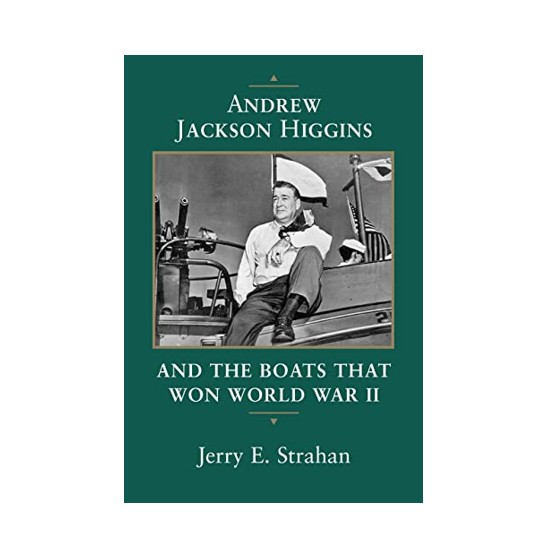Jerry E. Strahan’s biography, Andrew Jackson Higgins and the Boats that Won World War II, enlightens readers by detailing the contributions of one of the most overlooked figures of World War II. Higgins, a Louisiana-based boatbuilder and Nebraska native, revolutionized amphibious warfare by designing the LCVP (Landing Craft, Vehicle, Personnel)—the boats that made the D-Day landings possible. His innovations extended beyond Normandy though. In September 1943, his Higgins Industries was responsible for designing 92% of all Navy vessels in use.
Strengths
Strahan successfully explores Higgins’ relentless drive, his battles with bureaucracy and labor unions, and his commitment to producing the best landing craft for the Allied forces. Higgins was a fiercely independent and ambitious businessman who clashed with Washington officials but ultimately won their respect.
The book’s greatest strength is its detailed account of Higgins’ industrial contributions. Strahan goes into painstaking detail of Higgins’ production processes and output, which clearly placed Higgins Industries a head above its competitors. The book also highlights Higgins’ engineering genius, showing how his shallow-draft boats transformed military strategy. This gives substance to Dwight D. Eisenhower’s claim that Higgins is the man who won World War II for the Allies.
Strahan further depicts how Higgins exposed inefficiencies and bureaucratic obstacles within the U.S. military-industrial complex. He was outspoken about the slow-moving government procurement process, criticizing how military officials resisted innovation and clung to outdated designs. Higgins challenged traditional shipbuilding methods, proving that his assembly-line approach could produce landing craft faster and more efficiently than conventional shipyards.
Lastly, Strahan does a magnificent job of illustrating Higgins’ complicated relationship with labor unions. Through typical detailed accounts, Strahan explains how Higgins, once heralded as a champion of labor, eventually entered into very public disputes with the labor unions representing his workforce.
Drawbacks
However, the great detail Strahan puts into Higgins business model and manufacturing practices comes at a cost. The result is a lot of production numbers and profit margins. This might be intimidating for those looking for a casual read.
Another drawback is Strahan’s focus on Higgins’ professional achievements. This leaves Higgins personal life mostly unexplored. As a consequence, Higgins is left feeling somewhat unrelatable. Considering his fiery temperament in business affairs, readers may feel the book denies them interesting personal stories and thus a deeper understanding of Andrew Jackson Higgins as a whole.
Final Thoughts
Andrew Jackson Higgins and the Boats that Won World War II is an essential read for military history enthusiasts looking to go beyond the surface of the war. It sheds light on a forgotten hero whose innovations shaped the course of World War II. Eisenhower’s claim that Higgins won the war for the Allies may be perplexing to most. However, Strahan is able to illustrate why that claim isn’t so far-fetched.
If you are interested in the industry behind the war, this book is well-worth your time. For the casual reader, the book may feel too much like an assignment in an advanced history college course.
Related Posts:
Andrew Jackson Higgins: The Forgotten Hero of World War II
The Campaigns of Courage Tour and Meeting Interesting People

3 responses to “Andrew Jackson Higgins and the Boats that Won World War II, a 3-Minute Review”
It would seem logical and with merit that Higgins receive some type of medal for what he did for the war effort. I for one was not aware of what Higgins did to help win the war. Why hasn’t Higgins been lauded in history books and people made aware of all that he did? How about a statute or something to honor him. Great article which I thoroughly enjoyed.
It would seem logical and with merit that Higgins receive some type of medal for what he did for the war effort. I for one was not aware of what Higgins did to help win the war. Why hasn’t Higgins been lauded in history books and people made aware of all that he did? How about a statute or something to honor him. Great article which I thoroughly enjoyed.
Matt, given your knowledge of history, I would be interested in your answer to the question posted above. Why do you think more attention hasn’t been shown to Higgins given the high praise from Eisenhower?